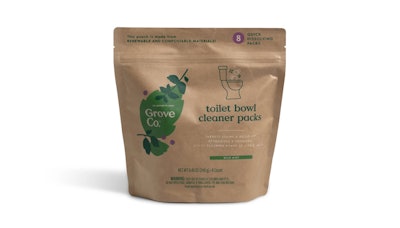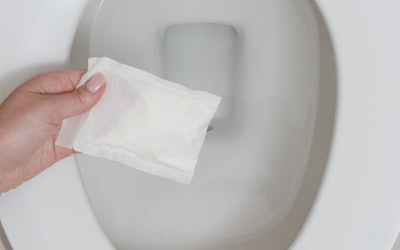
San Francisco-based Grove Collaborative, a certified B Corp and Public Benefit Corp, offers a range of environmentally friendly home and personal care products under its Grove Co. brand as well as from other companies. In August, the company launched what it calls “a major upgrade for Grove Co.’s portfolio,” with its new Toilet Bowl Cleaner Pods. The pods feature a zero-waste film that significantly reduces synthetic materials and are packaged in a new home-compostable pouch.
The pod was developed in partnership with SmartSolve, which engineered a dissolvable, cellulosic film technology that replaces a portion of the polyvinyl alcohol (PVA) typically found in dissolvable films. Each pod contains about 0.28 g of PVA compared to 0.45 g in a standard pod, for a 38% reduction in PVA plastic.
“The PVA is only present to ensure a solid seal of the pod, keeping the dry powder formula contained within the sachet, and to guarantee an overall quality customer experience,” explains Stephen Acciaioli, senior manager of packaging at Grove Collaborative.
 The pod uses a dissolvable, cellulosic film technology that replaces a portion of the PVA typically found in dissolvable films.Grove Collaborative
The pod uses a dissolvable, cellulosic film technology that replaces a portion of the PVA typically found in dissolvable films.Grove Collaborative
“While PVA has been scientifically shown to be biodegradable, safe for the environment, and not a contributing microplastic, it is still a synthetic plastic, and we only want to use it when a scalable alternative doesn’t exist,” he adds. “We’re always trying to do better and minimize the amount of synthetic materials in our products where we can, and this launch is a step in that direction.”
Not only does the pod reduce plastic, it reduces product waste, as well. “The pods provide consistent dosing every time so that customers don’t use too much, which is wasteful, or use too little, which is not as efficacious,” says Acciaioli. “Pre-dosed sachets are a convenient format that helps take the guesswork out of this particular area of home cleaning.”
The toilet bowl cleaner sachets are packed in a home-compostable pouch supplied by Grounded Packaging. The structure combines FSC-certified paper laminated with cellulose and biopolymer films, including polybutylene succinate (PBS). The zipper is also compostable, made from polylactic acid (PLA). The pouches are certified as both home compostable (AS 5810-2010) and industrially compostable (ASTM D6400).
Until the introduction of the new pods and compostable pouch, Grove Co.’s Toilet Bowl Cleaner was sold in a recyclable metal tin—the best available alternative to plastic when the company initially launched its pod products. According to Acciaioli, while metal is highly recyclable, it carries a larger carbon footprint than a flexible pouch. “Producing pouch packaging for 52,000 units [a standard order size when replenishing product purchase orders] generates roughly 5,774 kg of CO2 compared to 34,743 kg for the same number of tins,” he says.
The pouch also proves more sustainable than a traditional 16-oz spray bottle. When a single pouch of eight toilet bowl cleaner pods is compared with a bottle, the pouch reduces plastic by 67%. The pods, plus pouch, use 2.24 g of PVA and 10.2 g of bioplastics, respectively, while the bottle uses 36.9 g of plastic.
Grove Co.’s Toilet Bowl Cleaner Pods in an 8-ct pouch are available for $11.99 on the Grove Collaborative website. The company plans to expand the compostable pouch to other pod-based products in its lineup, including laundry detergent and dishwasher pods, by year end. PW
























